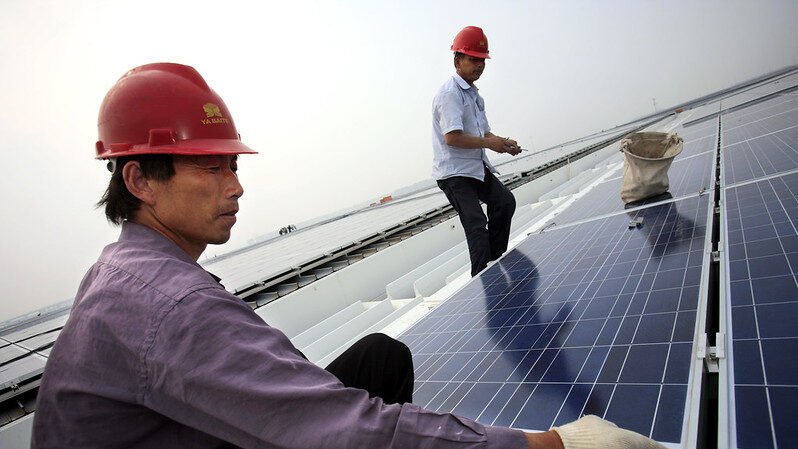China has opposed green projects by the UN’s flagship climate fund because their documents mentioned the risk of forced labour in the Chinese-dominated supply chains of solar panels.
At a meeting of the Green Climate Fund (GCF), China’s board representative Yingzhi Liu objected to six projects because their risk assessments highlighted the potential of forced labour use in the production of solar panels.
The programmes, which included efforts to help vulnerable communities in Sierra Leone, Benin and Laos cope with the impact of climate change, were eventually approved following a majority vote.
China manufactures four-fifths of all the world’s solar panels, having a near-total monopoly over the production of some silicon parts which form the core of solar cells.
Forced labour allegations
Beijing has faced multiple accusations of using forced labour practices in solar panel manufacturing. Concerns have focused particularly on the Xinjiang region, where the Chinese government has committed “serious human rights violations” against the Uyghur population, according to a UN report.
Xinjiang is the source of up to two-fifths of the world’s solar-grade polysilicon, a key raw material in the solar panel supply chain.
In 2021 academics at Sheffield Hallam University said that the biggest polysilicon producers in the region reported their participation in “labour transfer” programmes administered “in an environment of unprecedented coercion”.
The Chinese government disputes the presence of forced labour in its supply chains, arguing that employment is voluntary.
Chinese opposition
At this week’s GCF board meeting, China’s Yingzhi Liu said he opposed “the unsubstantiated allegations of so-called forced labour allegations in the solar supply chains” included in the project documents.
“It is unacceptable to have this sort of presumption of guilt and stigmatisation of the PV [photovoltaic] supply chain”, he added. “Chinese PV should be treated in a fair, just and non-discriminatory manner in GCF projects”.
Small islands struggle to get help from UN’s flagship climate fund
None of the project documents seen by Climate Home News mentioned China or Chinese companies directly.
Potential forced labour risks in relation to the supply chains of solar panels featured in the ‘environmental and social action plans’ that accredited entities are required to submit in their funding applications. The assessment allows project developers to rate potential risks and suggest ways to minimise them.
Laos project
Among the proposals the Chinese board member took issues with was a project by Save the Children Australia to strengthen the climate resilience of the health system in Laos, one of Asia’s poorest countries.
The documents submitted to the board said that Save the Children “understands the risk of forced and child labour with procurement of these systems [solar panels]” and will manage the risk through the procurement process.
China’s Belt and Road gets ‘green’ reboot and spending boost
Despite regarding the proposal as “good” overall, Liu opposed it for “singling out so-called forced labour” in the solar panel supply chain. The same happened with five more projects.
“They are all good projects with a high impact that will bring benefits,” he added at the end of the session.
Technical requirements
In response to Liu’s remarks, a representative of the GCF told board members that the fund “requires accredited entities to undertake due diligence to make sure there is no forced labour in primary supply chains”, in line with the performance standards set out by the International Finance Corporation – an arm of the World Bank.
The GCF added that all references made to forced labour are “technical” and “have no political dimension”. It also highlighted that the same risk assessments are applied to all supply chains and are not limited to the solar energy sector.
Climate Home found forced labour risks mentioned in projects not involving solar energy submitted to this week’s board meeting.
A proposal to increase climate-friendly rice production in Thailand included forced labour among the potential risks. The project proponents wrote that “although forced labour or child labour is not reported to be a serious problem in rice farming, measures need to be taken to inhibit these practices”. China did not object to that proposal.
